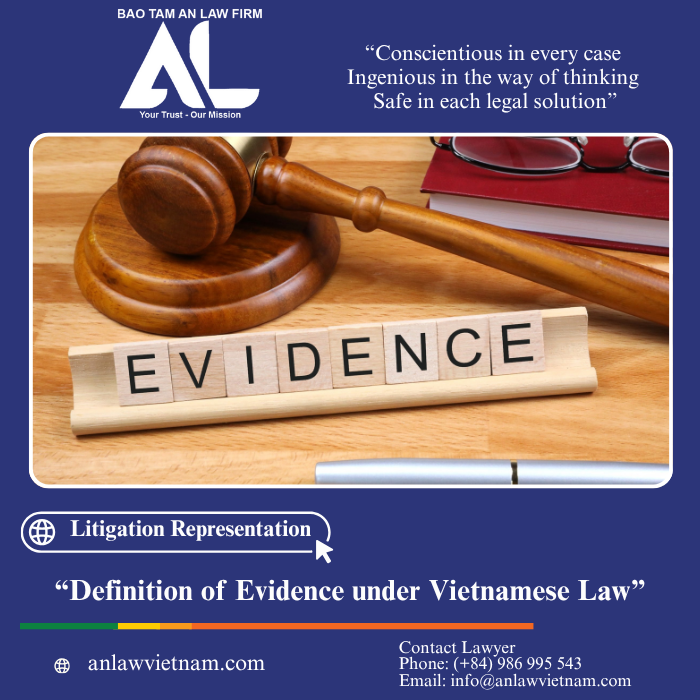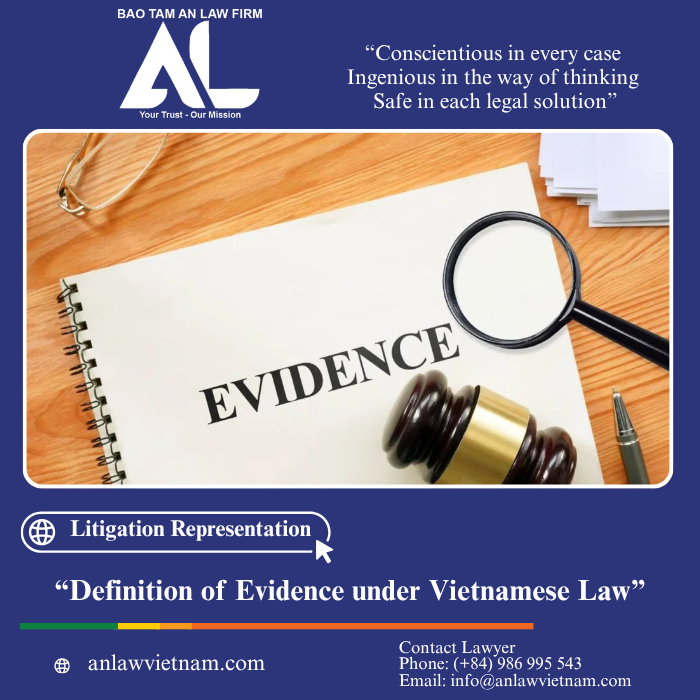Definition of Evidence under Vietnamese Law
Litigation Representation
A Comprehensive Guide for Foreign Nationals Accused or Seeking to Collect Evidence for Litigation in Vietnam
If you are a foreign national under criminal investigation, facing prosecution in Vietnam, or seeking to collect evidence for litigation or to protect your legal rights before a Vietnamese court, it is crucial to understand the legal framework governing evidence in Vietnam.
In the Vietnamese legal system, evidence serves as the cornerstone upon which investigative bodies, prosecutors, and courts establish the objective truth of a case.
The manner in which evidence is collected, assessed, and presented can directly determine the outcome of your matter.
With extensive experience in litigation, criminal defense, and civil representation for foreign clients, the team of lawyers at An Law Vietnam is well equipped to help you understand your rights, the procedural framework, and to assist you in the lawful collection, preservation, and presentation of evidence in Vietnam.

Definition of Evidence Under Vietnamese Law
According to Article 86 of the Criminal Procedure Code 2015, evidence is defined as facts or materials that are real, lawfully obtained, and used as a basis to determine:
- Whether or not a criminal act has been committed;
- Who committed such an act;
- Other circumstances relevant to the case.
In other words, evidence encompasses all information, documents, material objects, and electronic data that help clarify the facts of a case — including statements, documents, photographs, videos, expert conclusions, and technical reports.
Three Fundamental Characteristics of Evidence
When working with a criminal defense or litigation lawyer at An Law Vietnam, each piece of evidence will be examined against three essential legal criteria:
Objectivity
Evidence must reflect the objective truth of events — it cannot be falsified, altered, or fabricated.
Relevance
Evidence must be directly or indirectly related to the case, capable of proving the commission of a criminal act or clarifying exculpatory or mitigating circumstances.
Legality
Evidence only carries legal value if it is collected in accordance with lawful procedures, under proper authorization or supervision by competent authorities.
Evidence obtained unlawfully — such as through coercion, entrapment, warrantless searches, or unauthorized data collection — shall be excluded from the proceedings.
Common Sources of Evidence in Vietnam
Pursuant to Article 87 of the Criminal Procedure Code, evidence may originate from various sources, including:
- Physical evidence (objects, documents, instruments, or means used in committing the offense);
- Statements of the accused, witnesses, or victims;
- Electronic data (emails, text messages, videos, images, recordings, and digital files);
- Expert opinions and asset valuation reports;
- Records and reports issued by investigative, prosecutorial, or judicial bodies;
- Documents obtained through international judicial cooperation.
For foreign nationals, relevant evidence may include immigration records, contracts, bank statements, phone data, emails, residence records, or surveillance footage.
The Role of Evidence in Criminal and Civil Proceedings
During the Investigation Phase
Evidence is used to establish the nature of the act, the intent, the perpetrator, and the consequences of the conduct in question.
During the Trial Phase
The court relies on evidence to render a fair and lawful judgment, ensuring the right person is held accountable under the law.
In Defense Representation
An Law Vietnam’s lawyers use evidence strategically to:
- Prove the client’s innocence or reduced culpability;
- Challenge and refute prosecutorial evidence;
- Present exonerating or mitigating evidence;
- Protect the legal rights and interests of the defendant or claimant.
Electronic Evidence – A Modern Dimension in Vietnamese Proceedings
Under Article 99 of the Criminal Procedure Code, electronic data is defined as:
“Signs, letters, numbers, images, sounds, or similar forms created, stored, transmitted, or received through electronic devices.”
This means that emails, text messages, CCTV footage, social media data, recordings, or other digital information may be recognized as admissible evidence — provided they are collected, stored, and authenticated lawfully.
An Law Vietnam’s legal team assists clients in the authentication, verification, and lawful submission of electronic evidence for both criminal defense and civil litigation matters.

Rights of Foreign Nationals in Vietnamese Legal Proceedings
If you are a foreign national arrested, detained, or under criminal investigation in Vietnam, you are entitled to the following fundamental rights:
- To be informed promptly and clearly of the reasons for arrest and the charges against you;
- To appoint a criminal defense lawyer (English-speaking or with interpreter assistance);
- To receive translations of essential documents and procedural records;
- To present evidence and make statements in your defense;
- To challenge or request exclusion of unlawfully obtained evidence;
- To have an interpreter present during all procedural interactions and at trial.
The An Law Vietnam defense team has substantial experience handling cases involving foreign defendants, ensuring that your legal rights are fully protected in compliance with Vietnamese law and international due process standards.
Why Foreign Nationals Should Engage Legal Counsel for Evidence-Related Matters
Cases involving foreign individuals are often more complex due to:
- Language barriers and translation issues;
- Misunderstanding of Vietnamese legal procedures;
- Difficulties in obtaining and validating admissible evidence.
A professional litigation and defense lawyer will help you:
- Evaluate the authenticity and admissibility of evidence;
- Request the exclusion of unlawfully obtained materials;
- Seek expert opinions, certified translations, or additional verification;
- Gather and submit favorable evidence to defend your rights and reputation before the court.
Litigation and Defense Services for Foreign Nationals by An Law Vietnam
An Law Vietnam is a full-service law firm specializing in legal representation for foreign clients in Vietnam, with expertise in criminal, civil, and commercial litigation involving cross-border elements.
- Representation during investigation, prosecution, and trial;
- Collection, authentication, and protection of evidence in both criminal and civil proceedings;
- Coordination with investigative authorities, courts, embassies, interpreters, and family members;
- Criminal defense, litigation, appeals, and complaints to ensure full protection of your legal rights.
The litigation and criminal defense lawyers of An Law Vietnam possess extensive experience, operate fluently in both English and Vietnamese, and are well-versed in Vietnamese law and international legal practices.
With over 90% of our clients being foreign nationals, our lawyers approach every case with professionalism, empathy, and dedication — treating your matter as if it were our own.
Specialized legal assistance
If you are a foreign national under investigation, facing criminal charges, or seeking to collect evidence for litigation in Vietnam,do not face it alone. Contact An Law Vietnam today for confidential, timely, and professional legal support.
Contact Us
📞 Phone: (+84) 986 995 543
📧 Email: info@anlawvietnam.com
📍 Head Office: Diamond Plaza, 34 Le Duan Street, Sai Gon Ward, Ho Chi Minh City
🏢 Vung Tau Branch: Vo Thi Sau Street, Vung Tau Ward, Ho Chi Minh City
